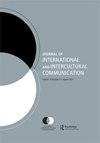“干得好,但保加利亚人”:通过文化话语分析识别“保加利亚性”
IF 2.2
Q2 COMMUNICATION
Journal of International and Intercultural Communication
Pub Date : 2020-05-13
DOI:10.1080/17513057.2020.1760919
引用次数: 1
摘要
通过使用文化话语分析和民族志,研究了自然发生的谈话和访谈,以检查“保加利亚性”的地方结构,以便制定关于“保加利亚”的明确和隐含的文化命题,以及关于存在的文化前提(“保加利亚性”是有问题的)和情感(愤怒,沮丧)相关联。这篇文章阐述了这个短语作为保加利亚话语中的一个地方文化符号的概念,它唤起了一种存在方式(“保加利亚性”和西方/东方二分法)、情感(沮丧、绝望)和社会世界(“保加利亚局势”)的深层文化含义,这与“巴尔干主义”的概念化有关。本文章由计算机程序翻译,如有差异,请以英文原文为准。
“Good job, but Bulgarian”: Identifying “Bulgarian-ness” through cultural discourse analysis
ABSTRACT By using cultural discourse analysis and ethnography, naturally occurring talk and interviews were examined for local constructions of “Bulgarian-ness” in order to formulate explicit and implicit cultural propositions about being “Bulgarian,” and cultural premises about being (“Bulgarian-ness” as problematic) and emotion (anger, frustration) as connected. This article illustrates the notion of the phrase as a local cultural symbol within Bulgarian discourse that evokes deep cultural meanings for a way of being (“Bulgarian-ness” and the West/East dichotomy), emotions (frustration, hopelessness), and a social world (the “Bulgarian situation”) as continuously negotiated in relation to conceptualizations of “Balkanism.”
求助全文
通过发布文献求助,成功后即可免费获取论文全文。
去求助
来源期刊

Journal of International and Intercultural Communication
COMMUNICATION-
CiteScore
3.80
自引率
12.50%
发文量
19
 求助内容:
求助内容: 应助结果提醒方式:
应助结果提醒方式:


